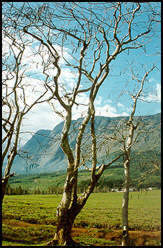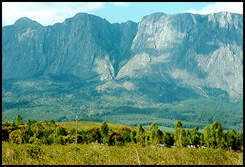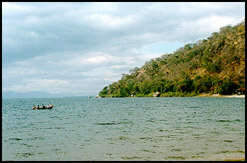 TOURISM: INVESTMENT FOR THE FUTURE... TOURISM: INVESTMENT FOR THE FUTURE... |
 GEOGRAPHY GEOGRAPHY |

Malawi is home to some of the most striking natural beauty in all of Africa, having a diversity of features like the lake, mountains and parks. Located in Southeastern Africa between the 9th and 17th parallels, Malawi is a long, narrow country bordered by Tanzania, Zambia and Mozambique. It has three major population centers namely: Mzuzu in the north; Lilongwe, the capital city, in the center; and Blantyre, the commercial city in the south.
 GOVERNMENT GOVERNMENT |
The country, Malawi, has undergone a social and political transformation over the past few years. A new multi-party, democratic government was ushered into power in 1994 in a peaceful and orderly manner and a number of changes for facilitating rather than regulating investment have since been created.
A new constitution that guarantees freedom of speech, religion and assembly is in place. It is also actively involved in a number of regional and international affairs. The market is free and open to encourage private sector's full participation in economic activities. In addition, Government is privatizing most of the government owned enterprises through the Privatisation process. It is has also improved the foreign investment climate through a number of excellent packages of incentives.
 ECONOMIC CONDITIONS ECONOMIC CONDITIONS |
Malawi's economy has for a long time been centered on agriculture which accounts for over 40% of all employment and over 80% of all exports and tobacco being the leading export product. Due to weather pattern changes and world price fluctuations on most agricultural products and further anti-smoking campaigns, it becomes expedient that the country has to explore other avenues of foreign exchange generation. Thus, the government has identified tourism development as a priority.
 TOURISM STATUS TOURISM STATUS |
Tourism currently plays a relatively small role in the economy of Malawi. However, Government recognizes that tourism is critically important for the Malawi economy, perhaps more so given the poor performance of tobacco in recent years. Tourism can be an engine of growth, capable of dynamizing and rejuvenating other sectors of the economy. It can significantly increase the country’s foreign exchange earnings; it can provide immediate employment; and it can significantly contribute to national income. In recognition of the key role of tourism in the Malawi economy, Government has made a decision to develop and promote tourism as a matter of priority.
 VISION VISION |
The Malawi Government’s vision is to turn the country’s natural assets into tourism opportunities that will eventually deliver benefits to all its citizens. To this end, Government will develop the tourism sector as a national priority in a sustainable and acceptable manner with a view to optimizing the contribution of the industry to national income, employment and foreign exchange earnings through the creation of a favourable environment for private sector involvement. Government will promote tourism as a partner to agriculture in order to broaden the country’s sources of foreign exchange. Tourism offers opportunity for providing income-generating activities for people currently engaged in unsustainable primary resource harvesting. Tourism is also an efficient catalyst for distribution of wealth from the major urban centers to rural areas.
Over the past years, the number of visitors to Malawi has been increasing at an average annual rate of 7%, the number of visitors has increased from 162,559 in 1994 to 217,937 in 1998. Provisional figures for 1999 indicate that about 250,000 visitors will be recorded, representing an increase of 34% between 1994 and 1999. Visitor expenditure also increased from MK137, 000,000 (MK15=1USD) in 1994 to MK174, 349, 600 in 1998. In 1999, international tourism receipts are estimated to exceed MK1, 200,000,000 (MK44=1USD). The average expenditure per person per night has also changed significantly from MK64 in 1994 to MK1, 959 in 1999.
At a regional level, 10 million international visitors were recorded in 1997 and the total receipts of 4 million US Dollars were received. All these figures indicate that Malawi has a great potential for tourism development. With clear and sound policies that have been put in place, it will be able to tap from what the region is getting and with intensification of promotional campaigns; the contribution of tourism to the national economy will significantly change.
The future is expected to see Malawi be more dependent on tourism as the uncertainties in commercial agriculture grow, population continues to grow and need for incomes and employment increases. As long as the demand for tourism continues to increase and the country is able to add new products and services to the current stock available on the market, tourism will probably be the most viable means of diversifying the Malawi economy.
 GROWTH OF WILDLIFE-BASED TOURISM GROWTH OF WILDLIFE-BASED TOURISM |
The Government has adopted a policy that allows private operators to manage tourism enterprises in all the national parks. The result has been improved standards of services in the tourist lodges in the parks. The Government has also adopted a policy of ensuring that communities living around National Parks are allowed access to some of the natural resources of the parks, as well as sharing in the revenues generated from the tourism activities.
The tourism income sharing arrangement has already started around the Nyika National Park. Tourism Revenue collected by the park's authorities and then paid directly to the communities, is already assisting in community projects.
 NEW TOURISM PROJECTS NEW TOURISM PROJECTS |
The UDF Government’s policy for tourism development in the next five years is to ensure that the number of international class hotels is increased throughout the country. The following are some of the projects, which the Government is promoting for investment:
 LAKESHORE HOTELS AND LODGES LAKESHORE HOTELS AND LODGES |

Lake Malawi stretches across 23,000 square kilometers, the lake is 570 kilometers long and 16 to 80 kilometers wide. It is a large Inland Sea harbouring over 800 species of fish. Lake Malawi is one of the largest lakes in the world and forms the focal point of Malawi's tourism investment potential with its breath-taking scenery, beautiful beaches and a variety of wildlife. The lake is ideal for water sports like water skiing, scuba diving, and wind surfing. Some hotels and lodges are proposed for development on the lakeshore:
 100 BED HOTEL AT CAPE MACLEAR, MANGOCHI 100 BED HOTEL AT CAPE MACLEAR, MANGOCHI |
Cape Maclear is on the southern lakeshore of Lake Malawi in Mangochi District. The project site will be at Golden Sands, which is within Lake Malawi National Park. It is aimed at providing good standard tourist accommodation at this prime and scenic area of the lake. Around the area, there is low type of accommodation standards and yet the area is one of the best tourism potential sites in the country. Government is looking for a joint venture partner with Malawi Development Corporation (MDC) as the majority shareholder.
 ONE HOTEL OF 50 BEDS AT LIKOMA ISLAND ONE HOTEL OF 50 BEDS AT LIKOMA ISLAND |
Likoma Island is on Lake Malawi and has very beautiful beaches with an old cathedral. It is already receiving tourists but there is shortage of accommodation. To facilitate the development of the Island as a tourist destination, the proposed hotel will boost visitation and enable tourists experience something different besides being a major economic activity. Alongside the project will be Government capital investment into infrastructure like power, roads, telecommunications and upgrading of the airstrip to compliment the hotel.
 70-BED ROOM LODGE AT MWAYA, NKHATA BAY 70-BED ROOM LODGE AT MWAYA, NKHATA BAY |
Mwaya is in the northern part of the Lakeshore in Nkhata bay District. It is close to Chintheche Inn that has only 20 rooms and often full. There are also a number of small resorts around which are of low standard. Mwaya having good beaches will compliment the development at Likoma and offer accommodation to tourists en-route to further south and up north. An access road of one kilometre will be upgraded. |  50 ROOM LODGE AT CHIFYO BEACH IN KARONGA 50 ROOM LODGE AT CHIFYO BEACH IN KARONGA |
Chifyo is located in Chilumba in Karonga and is not very far from the jetty. The beach is unspoiled and has golden sands. Behind it are fishing and traditional villages and in front crystal clear waters of Lake Malawi. To the southwest lie the Nyika National Park and Livingstonia Plateaus. Apart from ships from Malawi that dock at the jetty, private vessels from Tanzania transport passengers between Tanzania and Malawi. The Lodge will hence provide accommodation to tourists at this busy area.
 CITY HOTELS CITY HOTELS |
Lilongwe, the Capital City and Blantyre, the commercial city, both attract large numbers of visitors. Specific opportunities exist in new hotels and lodges. Investments in city-center restaurant operations and lay byes on Malawi's roads are sought. Other than these, investment is sought for two major hotels;
 ONE FIVE STAR HOTEL OF 200 ROOMS IN BLANTYRE ONE FIVE STAR HOTEL OF 200 ROOMS IN BLANTYRE |
To increase hotel accommodation in the country's commercial and industrial city. Blantyre is the major city in Malawi and is also situated close to many tourist attraction areas. It is also currently served by direct flights from South Africa. In 1997 and 1998, the average room occupancy rates were 68% and 67%, respectively. At other times, occupancy rates average 80 to 90%. There is therefore enough justification to increase the number of hotel rooms in the city.
 ONE FIVE STAR HOTEL OF 200 ROOMS IN LILONGWE ONE FIVE STAR HOTEL OF 200 ROOMS IN LILONGWE |
The proposed hotel willsupplement existing hotel accommodation in the capital city, which is growing fast and needs additional hotels more especially now. At the moment, existing city accommodation units can only take up to 300 guests. Further, Malawi being a growing tourist destination, Lilongwe is a gateway to all tourists' destinations in the country as most international flights land in the capital. In 1997 and 1998, room occupancy rates were 66% and 72%, respectively with some higher rates of 80% 0r more. To sustain the growing demand, there is need for other hotels in the city.
 CONFERENCE CENTERS CONFERENCE CENTERS |
The proposed project is to construct three conference centers, one in Lilongwe, one in Blantyre and a smaller one at the Lakeshore. The conference center in Lilongwe and Blantyre should have a capacity of 1,000 people each, with breakaway rooms to cater for huge conferences.
The conference center at the lakeshore should have a capacity of 500 people with breakaway rooms to cater for big conferences. Malawi is promoting conference tourism. The country has not been able to host big conferences due to limited accommodation and lack of conference centers that can cater for such conferences.
 LODGES AT OTHER ATTRACTIONS LODGES AT OTHER ATTRACTIONS |
40 ROOM LODGE AT LIKHUBULA IN MULANJE
The lodge will cater for tourist accommodation at Likhubula in Mulanje where there is the highest mountain in Central Africa. The area is already patronized by a lot of tourists who visit the peak, tea plantations, natural cool ponds, trout fishing and bird watching. At present, visitor facilities in terms of accommodation and catering are limited.
The Mulanje Massif is a huge, isolated block of mountains of more than 245 square miles or 620 square kilometers. It is situated in the southeast corner of Malawi, close to the Mozambique border. The massif, commonly known as Mulanje Mountain, measures approximately 16 by 13 miles or 26 by 22 Kilometers. The highest point is Sapitwa, at 9,855 feet or 3,002 meters above sea level.
Mulanje offers a wide scope of activities from rock climbing, mountain walking, trout fishing and mountain biking. It is the mountain walker, casual climber, rambler and nature lover that Mulanje has most to offer. The mountain mostly offers walking tours of two to six days.
40 ROOM LODGE AT KAPICHIRA FALLS IN CHIKWAWA
The Kapichira Falls are the furthest point that can be reached by vessels coming upstream from the Zambezi. They were the barrier met by David Livingstone on his way up the Shire River that effectively rendered further upstream navigation impossible. Three of the early missionaries lie buried in the Kapichira Falls and Chikwawa area. The falls are the last of the Shire's cataracts, and consist of a series of rapids and cascades. The falls are about 70 Km or two hours drive from Blantyre.
The area is very attractive due to scenery and the falls. Located inside Majete Game Reserve, the Falls are also in close proximity to Lengwe National Park for game viewing. Angling will be a major activity that will take place near the Lodge. The access road to the area is good. Kapichira Falls is already visited by a lot of visitors although visitor facilities are minimal. Development of the 40-room lodge will offer opportunities for visitors to stay in close proximity of the Falls and take up game viewing in both Majete Wildlife Reserve and Lengwe National Park.
40 ROOM LODGE AT MANCHEWE FALLS IN RUMPHI

Manchewe Falls is on Manchewe River near Lukwe in Livingstonia, Rumphi. It has two Falls that fall about 200 metres. Natural trees and steep slopes with natural pools surround the area. Near the Falls is Lukwe Permaculture Camp under construction, Livingstonia Mission, Nyika National Park, Chitimba Beach, Lake Malawi and Chiweta Hotsprings. An Eco-tourism lodge to blend with the natural surroundings is hence needed. However, walking trails and access steps to the Falls will have to be developed together with a good road.
 LODGES IN NATIONAL PARKS AND WILDLIFE RESERVES LODGES IN NATIONAL PARKS AND WILDLIFE RESERVES |
30 ROOM LODGE IN LIWONDE NATIONAL PARK
Liwonde National Park is on the main tourist route in Malawi. Situated close to the main road (M1), the park boats of a wide variety of species of wild animals. Amongst some are the sable antelopes, the Black rhino, buffaloes, waterbuck, impala, elephants, hippos and crocodiles to mention a few. The park at present has only one lodge, which is fully booked most of the time. The new lodge is therefore being promoted to ensure that there is adequate accommodation for visitors to the most popular national park in Malawi.
50 ROOM LODGE IN NKHOTAKOTA WILDLIFE RESERVE
Nkhotakota wildlife reserve offers great potential for tourism development. Situated on the escarpments of the lakeshore, the reserve offers an opportunity for game viewing and a lakeside holiday at the same time. Game viewing in Nkhotakota wildlife reserve is excellent with opportunities to see elephants. The reserve is a paradise for birdwatchers and those that enjoy sport fishing. The wildlife reserve does not have accommodation facilities for visitors at present. This Lodge therefore is promoted for investment as the first tourist lodge for Nkhotakota Wildlife Reserve.
DEVELOPMENT OF CULTURAL VILLAGES AND LODGES
The trend for tourism in the world is changing. Tourists are no longer just interested in relaxing at the hotels and lodges. Visitors want experiences, and given the opportunity, many people visiting African countries would also like to meet the local people, see how they live and maybe even stay a few days in a traditional village to experience the local culture.
Investment into Cultural Based tourism is promoted in Malawi due to the diversity of the peoples and their cultures. Such investment is mostly viable when the cultural village is attached to a lodge to cater for the tourists who may opt for the comforts of a lodge after spending a day in the cultural village.
Potential areas for development of cultural Based tourism have been identified in Mangochi, Kasungu, Rumphi, and Mulanje. It is important to note that there are many other areas with a lot of potential for development of this type of tourism.
 OTHER TOURISM RELATED INVESTMENTS OTHER TOURISM RELATED INVESTMENTS |
WATER TRANSPORT
There is need for a tourist boat for sight seeing on Lake Malawi. Other than this, there is also need for a tourist passenger ship to transport visitors/tourists on Lake Malawi, especially to reduce transport problems between Likoma/Chizumulu Islands and the mainland.
GROUND TRANSPORT
Decent coaches and buses in major tourist attraction areas need to be introduced. At present, some tourists have problems with movements from one attraction to another due to limited coaches and buses. At present, there are no reliable transport facilities even between cities and the two international airports, Chileka and Lilongwe International. |

